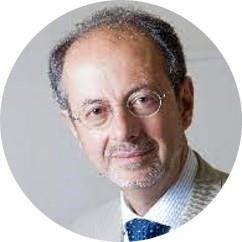
Vincenzo Valentini
Radiation oncologist and Head of Department of Radiology,
Radiation Oncology and Haematology
Fondazione Policlinico Universitario A.Gemelli IRCCS
Università Cattolica S.Cuore
Rome Italy
PDF Version
What have been the highlights of your career?
I consider it a highlight of my profession every time I perceive in the eyes of patients that they feel welcomed, cared for and accompanied; every time a colleague tells me that their professional position can be traced back to the training period they had with me; and every time I see colleagues apply the results of my research.
What do you think are the next challenges for radiotherapists?
I have always considered my discipline beautiful and complete, because it has always offered technological and clinical challenges that have been vital and enriching. I now believe that the next challenges for radio-oncology will be increasing amounts of imaging, artificial intelligence, omics and humanistic guidance.
What does this award mean to you?
Throughout my career, I have looked to Professor Jens Overgaard as a sure guide to how one can be evidence-based, translational, visionary and at the same time a custodian of valuable knowledge and organisational models. My receipt of this award that bears his name, and which will be presented to me by him in person, is a great honour for me.
To whom would you like to dedicate the award?
To the patients, the best teachers of my being a doctor; to my older colleagues and peers, and younger ones, because everyone who has been with me has enriched me; to my university for having supported me to 'uni vertere' (convergence to unity), in other words, to enable me not to lose sight of the unity of the human being, made up of physicality and actionable values; to the people who, with friendship, have accompanied me on certain segments of my life journey and have helped me to discover the opportunities that different interpretations of the path can have; and to my family and my wife in particular, the great architect of my person.
What was your involvement in ESTRO?
I was privileged to participate in the founding of ESTRO in 1981 in Milan and the first ESTRO congress in 1982 in London. Since then, ESTRO has been the platform on which I have built knowledge, professional relationships, friendships and scientific inspiration. In 1981 I could not have imagined that I would become its president and impregnate myself with that scientific-relational dimension, the true essence of ESTRO, which is part of me today.
Where does your interest in science come from?
The study and use of science have been fundamental for me to enjoy fully the great dimensions of humans (culture, art, emotions, self-care, spirituality, politics...) in history, considering that the daticity of the world does not encompass the whole of humanity, but without it one could not be human. The presence of the limit in the physicality of the world (death, pain...) is evident. The constant search for overcoming the limits of this physicality is an inescapable dimension of life that has always fascinated me, while remaining aware that this search always involves a choice of whether to prioritise ourselves or others.
Did your parents encourage you in your career or would they have preferred you to do something else?
My parents always respected my freedom to choose the profession of physician, even though they knew it would interrupt the family tradition of craftsmanship. They have always supported me in many ways and shared their satisfaction with how I interpreted their support, thus testifying that this was their role as parents: to welcome, care for and accompany their son and then leave him to continue his life alone and not for them.
What do you do in your spare time?
I consider myself a free person always, whether when I am working, when I am with family and friends, or when I am pursuing the depth of the human in art or the beauty of nature. There is no such thing as free or busy time; I think that the same personality I express at 'work' is the one I put into the time when I am 'not working'. I am oriented towards different goals when I am working or not working, but they are all related to the freedom to try to go further to meet someone else.
When do you plan to retire and what would you like to do then?
Imagining the future is one of a person’s great dimensions, but the reality of history shows in many cases, there is a distance between what is imagined and what actually happens. Therefore, I prefer to be open to many situations, including unforeseen ones, as long as they make me live. Trying to be in continuity with what I have realised makes the most sense for me and at the same time stimulates me to be creative. A phrase by George Bernard Shaw has always been important to me: "You see things and say ‘Why?’, but I dream things that never were and say ‘Why not?’"